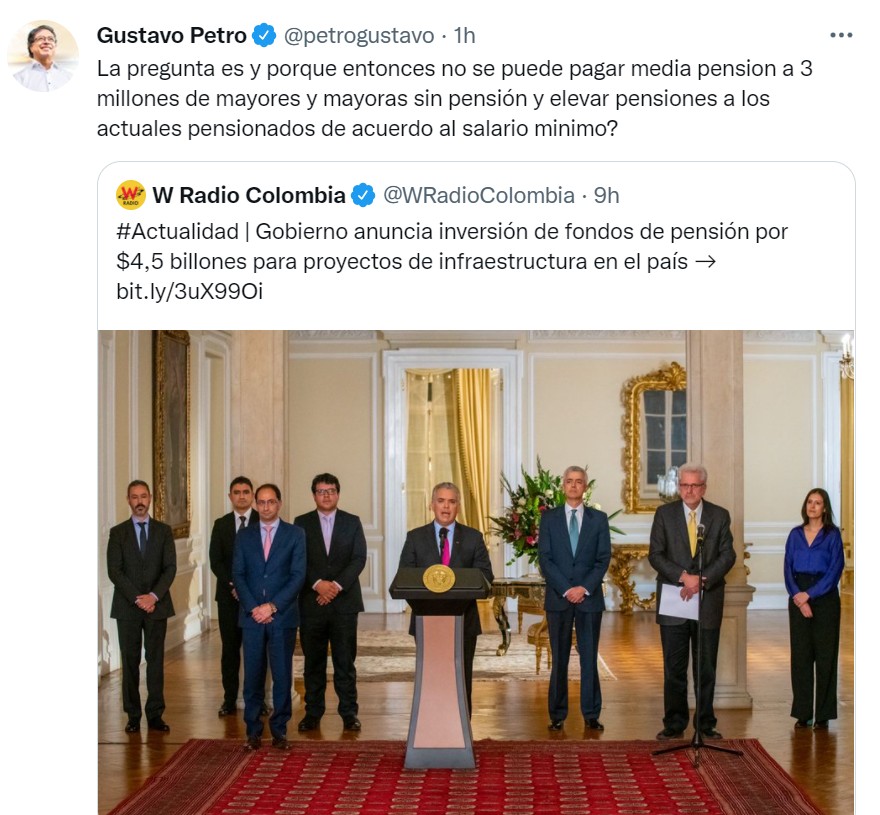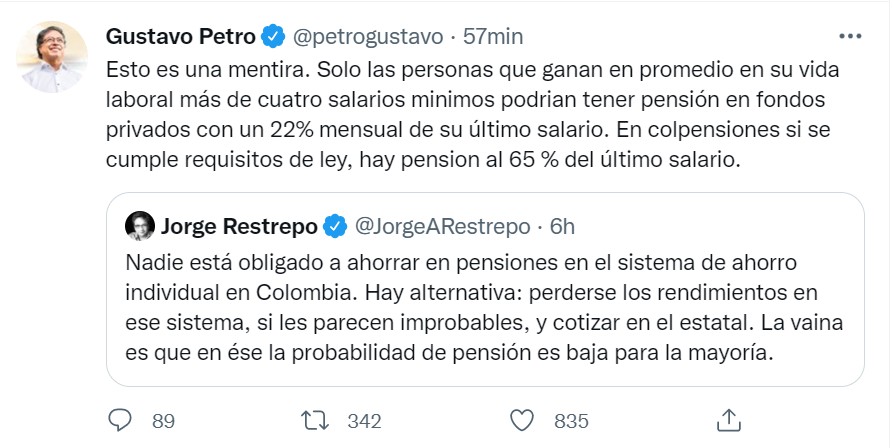
President Iván Duque announced that private pension funds have agreed to invest an additional 4.5 billion for infrastructure projects in the country, a agreement that the president described as historic and which he took the opportunity to criticize, for the second time in the last month, the proposal of presidential candidate Gustavo Petro with regard to the administration of the pension system in its possible government, but not to mention it.
During the presidential address, the head of state emphasized that with this new agreement, pension fund investment in infrastructure projects is almost 9 billion (one point of GDP); more than 33 billion in development companies and energy projects, as well as 64 billion more in other sectors of equity investment.
“Why is it important to say all this? Because this investment is for the well-being of Colombians and is also financed responsibly by the savings of Colombians, generating profitability for Colombians and, at the same time, promoting the business, social and economic development of our country, it contributes to the generation of jobs and also contributes to the transformation of different regions of our country”, said the president.
In this regard, President Duque referred to the administration of pension funds, which, according to him, must be maintained as has been done to ensure profitability, based on a projection of almost 174 billion in the next decade. There he again questioned the proposal of candidate Petro, based on his interpretation.
“That is why I reaffirm myself in what I have said: any precedent, any situation that seeks to expropriate the resources of people's savings in pension funds must be rejected clearly and forcefully, because using the resources of people's savings to nationalize them and convert them into pocket money is a robbery, a robbery,” said the president.
Petro assured that his proposal to reform the pension system is based on a system of pillars, with the coexistence of private funds with the public, but prioritizing the second. It proposes a free transition of contributors that will allow the transfer of up to 20 billion contributions in private funds to Colpensiones, which in turn would reduce the compensation of the general budget of the Nation.
But President Duque and several critics have described this proposal as an expropriation of the resources of private funds and the individual savings of contributors. For that reason, the president said on Monday that “this institution responds to Colombia and that we have to preserve and take care of it.”
“We must be very clear that these ideas of wanting to expropriate, confiscate the resources that belong to citizens, to put them at the service of state whims are a failed mechanism and that has failed in other countries,” President Duque assured regarding the financing agreement signed.
The Historic Pact candidate also questioned the agreement signed by President Duque. “The question is why [sic.] then can't you pay half board to 3 million seniors and seniors without pensions and raise pensions to current pensioners according to the minimum wage? ”, he wrote on his Twitter account.

This is because for Petro, with the transfer of contributors from the private regime to the public he proposes, up to 18 billion will be released from the general budget that will allow to guarantee a half-wage bonus to people who currently do not have a pension. Under current conditions, only 25% of contributors are able to receive allowances.

“Only people who earn more than four minimum wages on average in their working lives could have pensions in private funds with 22% per month of their last salary. In Colpensiones if legal requirements are met, there is a pension at 65% of the last salary,” the candidate added to the discussion.
KEEP READING:
Últimas Noticias
Debanhi Escobar: they secured the motel where she was found lifeless in a cistern
Members of the Specialized Prosecutor's Office in Nuevo León secured the Nueva Castilla Motel as part of the investigations into the case

The oldest person in the world died at the age of 119
Kane Tanaka lived in Japan. She was born six months earlier than George Orwell, the same year that the Wright brothers first flew, and Marie Curie became the first woman to win a Nobel Prize

Macabre find in CDMX: they left a body bagged and tied in a taxi
The body was left in the back seats of the car. It was covered with black bags and tied with industrial tape
The eagles of America will face Manchester City in a duel of legends. Here are the details
The top Mexican football champion will play a match with Pep Guardiola's squad in the Lone Star Cup

Why is it good to bring dogs out to know the world when they are puppies
A so-called protection against the spread of diseases threatens the integral development of dogs




